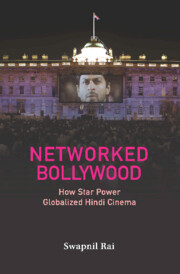
- Publisher:
- Cambridge University Press
- Online publication date:
- January 2024
- Print publication year:
- 2024
- Online ISBN:
- 9781009400602

Networked Bollywood provides interdisciplinary analysis of the role of the stars in the transformation of Hindi cinema into a global entertainment industry. The first Indian film was made in 1913. However, filmmaking was recognized as an industry almost a hundred years later. Yet, Indian films have been circulating globally since their inception. This book unearths this oft-elided history of Bollywood's globalization through multilingual, transnational research and discursive cultural analysis. The author illustrates how over the decades, a handful of primarily male megastars, as the heads of the industry's most prominent productions and corporations, combined overwhelming charismatic affect with unparalleled business influence. Through their “star switching power,” theorized here as a deeply gendered phenomenon and manifesting broader social inequalities, India's most prominent stars instigated new flows of cinema, industrial collaborations, structured distinctive business models, influenced state policy and diplomatic exchange, thereby defining the future of Bollywood's globalization.
‘In this boldly imagined, deeply researched, and beautifully written book, Swapnil Rai offers a distinctive account of why film stars matter. Moving deftly across key turning points in Indian film history, Rai shows that stars mobilized their charisma on- and off-screen to forge surprising new business relationships, establish powerful production and distribution networks that spanned the globe, and position the Hindi film industry as a truly transnational enterprise. This book joins a growing body of scholarship that pushes the study of global media industries onto new terrain and is sure to be read, taught, and cited for years to come.'
Aswin Punathambekar - University of Pennsylvania
‘A riveting reading, Swapnil Rai's book greatly deepened and broadened my understanding of Indian cinema's global presence in two spheres. First, it brought into consideration a great deal of archive-derived information about various contextual factors (festivals, award ceremonies, workshops, diplomatic events, delegations, media stints) that perpetuated and consolidated Bollywood's global reach over the decades. Second, it provided a deep analysis of the family(-and-friends) cluster production models that characterize India's commercial cinema. From Raj Kapoor and entourage in the post-colonial 1950s to the present-day sprawling family set-ups springing off from the Bachchans, the study brings together a great deal of material in a way that allows for the seamless integration of Indian film history in a comprehensive global narrative of stars, celebrity culture, and circulation.'
Dina Iordanova - University of St Andrews
‘In this dynamic, layered book, Swapnil Rai explores the shifting role of stars (ranging from Raj Kapoor to Amitabh Bachchan, from Shah Rukh Khan to Priyanka Chopra) in the globalization of the Bollywood audience, the restructuring of the Indian media sector, and the relationship between popular culture and state power. Rai reframes, re-stories, and revitalizes the history of Hindi popular cinema with her imaginative approach and extensive research.'
Henry Jenkins - University of Southern California, Los Angeles
 Loading metrics...
Loading metrics...
* Views captured on Cambridge Core between #date#. This data will be updated every 24 hours.
Usage data cannot currently be displayed.